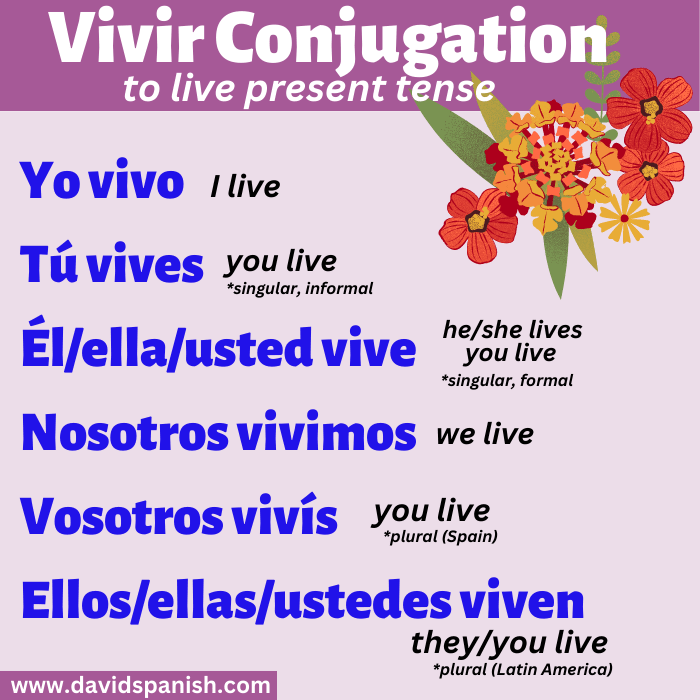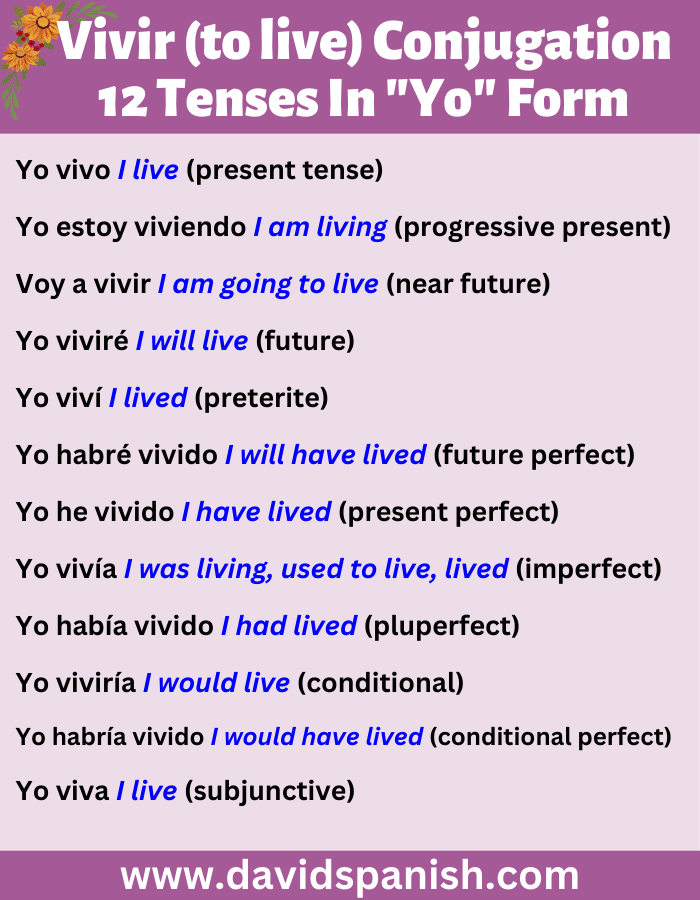Vivir (Meaning: to live in Spanish) is an essential verb for students of all levels. The conjugation of vivir in the present tense is: Yo vivo (I live), tú vives (you live), él/ella/usted vive (he/she lives, you live), nosotros vivimos (we live), vosotros vivís (you live) and ellos/ellas/ustedes viven (they/you live).

Vivir is an example of a regular IR verb. This means two things: 1) Its endings are the same as all other regular IR verbs when conjugated in the present tense and 2) It has no stem changes when conjugated in the present tense. This page on our site covers regular and irregular Spanish IR verbs in detail.
Vivir conjugated in the present tense

Further down the page we offer conjugation charts with example sentences for vivir in the following ten commonly used Spanish verb tenses:
- Present tense (presente de indicativo)
- Progressive present (presente progresivo)
- Near future (futuro inmediato)
- Future tense (futuro)
- Preterite (pretérito)
- Present perfect indicative (perfecto de indicativo)
- Imperfect (imperfecto de indicativo)
- Conditional (potential simple)
- Present subjunctive (presente de subjuntivo)
- Imperative (imperativo)
Vivir conjugation table

The following graphic shows conjugations for vivir in the first-person singular (yo) form in twelve verb tenses.

Vivir conjugation charts
Present tense (presente de indicativo)
In the present tense, yo vivo translates to “I live” and “I am living”. Note, to indicate where a person lives, use vivir + preposition en. This page covers vivir en vs. vivir a.
| yo vivo | I live | Vivo en los Estados Unidos. | I live in the USA. |
| tú vives | you live | Vives en México. | You live in Mexico. |
| él/ella, usted vive | he/she lives, you live | Él vive en Costa Rica. | He lives in Costa Rica. |
| nosotros vivimos | we live | Vivimos en España. | We live in Spain. |
| vosotros vivís | you live | Vivís en Cataluña. | You live in Catalonia. |
| ellos/ellas, ustedes viven | they/you live | Viven en Cartagena. | They live in Cartagena. |
Progressive present (presente progresivo)
The progressive present combines the present tense of estar (to be) with the present participle. Yo estoy viviendo translates to “I am living”.
| yo estoy viviendo | I am living | Estoy viviendo en las Montañas Rocosas en este momento. | I'm currently living in the Rocky Mountains. |
| tú estás viviendo | you are living | ¿Dónde estás viviendo? | Where are you living? |
| él/ella usted está viviendo | he/she is living, you are living | Ella está viviendo con sus familiares. | She's living with her relatives. |
| nosotros estamos viviendo | we are living | Estamos viviendo bien en este momento. | We've living well now. |
| vosotros estáis viviendo | you are living | ¿Estáis viviendo con los niños? | Are you living with the kids? |
| ellos/ellas, ustedes están viviendo | they/you are living | No están viviendo juntos. | They're not living together. |
Near future (futuro inmediato)
The near future tense combines the present tense of ir (to go) with the preposition a and an infinitive. Yo voy a vivir translates to “I am going to live”. Note that vivir + a is used to express a place where one is “moving to”.
| voy a vivir | I am going to live | Voy a vivir a la Ciudad de México. | I'm going to live in Mexico City. |
| tú vas a vivir | you are going to live | Vas a vivir a San José. | You're going to live in San Jose. |
| él/ella, usted va a vivir | he/she is going to live, you are going to live | Él va a vivir a Los Ángeles. | He's going to live in LA. |
| nosotros vamos a vivir | we are going to live | Vamos a vivir más cerca de la playa. | We're going to live closer to the beach. |
| vosotros vais a vivir | you are going to live | Vais a vivir a Mallorca. | You're going to live in Mallorca. |
| ellos/ellas, ustedes van a vivir | they/you are going to live | Ustedes van a vivir a Sydney. | You are going to live in Sydney. |
Future tense (futuro)
In the future tense, yo viviré translates to “I will live”.
| yo viviré | I will live | Viviré en esta casa. | I'll live in this house. |
| tú vivirás | you will live | ¿Vivirás con tu familia política? | Will you live with your in-laws? |
| él/ella, usted vivirá | he/she will live, you will live | Vivirá en el norte de México. | He'll live in Northern Mexico. |
| nosotros viviremos | we will live | Viviremos en España en un departemento. | We'll live in Spain in an apartment. |
| vosotros viviréis | you will live | ¿Viviréis juntos o seperados? | Will you live together or apart? |
| ellos/ellas, ustedes vivirán | they / you will live | ¡Vivirán en una casa enorme! | They'll live in an enormous house. |
Preterite (pretérito)
The preterite tense is used to express actions which occurred at specific times. Yo viví translates to “I lived”.
| yo viví | I lived | Viví en Montreal durante cuatro años. | I lived in Montreal for four years. |
| tú viviste | you lived | ¿Dónde viviste en Italia? | Where did you live in Italy? |
| él/ella, usted vivió | he/she/you lived | ¿Vivió en América Central? | Did you live in Central America? |
| nosotros vivimos | we lived | Vivimos en la Costa Brava. | We lived in the Costa Brava. |
| vosotros vivisteis | you lived | ¿Vivisteis en las Islas Canarias? | Did you live in the Canary Islands? |
| ellos/ellas, ustedes vivieron | they/you lived | Vivieron en San Carlos de Bariloche. | They lived in San Carlos de Bariloche. |
Present perfect indicative (perfecto de indicativo)
The present perfect tense is formed by combining haber (to have) in the present tense with the present participle. Yo he vivido translates to “I have lived”.
| yo he vivido | I have lived | He vivido en este departement desde hace dos años. | I've lived in this apartment for two years. |
| tú has vivido | you have lived | Has vivido en Texas desde hace un mes. | You've lived in Texas for one month. |
| él/ella, usted ha vivido | he/she has lived, you have lived | Ha vivido con su novia desde hace mucho tiempo. | He's lived with his girlfriend for a long time. |
| nosotros hemos vivido | we have lived | Hemos vivido en California desde dos mil seis. | We've lived in California since 2006. |
| vosotros habéis vivido | you have lived | Habéis vivido en Barcelona desde hace muchos años. | You've lived in Barcelona for many years. |
| ellos/ellas, ustedes han vivido | they/you have lived | Nunca han vivido junos. | They've never lived together. |
Imperfect (imperfecto de indicativo)
The imperfect is used to describe past actions which occurred at unspecified times.
| yo vivía | I used to live (or was living, lived) | Cuando era nino vivía en los Estados Unidos. | When I was a child I used to live in the USA. |
| tú vivías | you used to live | ¿Dónde vivías en la universidad? | Where did you used to live in university? |
| él/ella, usted vivía | He/she/you used to live | Vivía en Grecia con sus primos. | He used to live in Greece with his cousins. |
| nosotros vivíamos | we used to live | El el pasado vivíamos en Argentina. | In the past we used to live in Argentina. |
| vosotros vivíais | you used to live | Vivíais en Espana cuando encontraste a vuestros amigos. | You were living in Spain when you met your friends. |
| ellos/ellas, ustedes vivían | they/you used to live | Vivían juntos durante mucho tiempo. | They lived together for a long time. |
Conditional (potential simple)
The conditional tense is used to express hypothetical actions. Yo viviría translates to “I would live”.
| yo viviría | I would live | Yo viviría en Japón si hablara japonés. | I'd live in Japan if I spoke Japanese. |
| tú vivirías | you would live | Vivirías en México si fueras jubilado. | You'd live in Mexico if you were retired. |
| él/ella, usted viviría | he/she/you would live | Viviría en España pero prefiere Costa Rica. | He's live in Spain but he prefers Costa Rica. |
| nosotros viviríamos | we would live | Viviríamos juntos si fuéramos casados. | We'd live together if we were married. |
| vosotros viviríais | you would live | Viviríais en las montañas si disfrutaras de la nieve. | You'd live in the mountains if you enjoyed the snow. |
| ellos/ellas, ustedes vivirían | they/you would live | Vivirían en California si fueran ciudadanos americanos. | They've live in California if they were American citizens. |
Present subjunctive (presente de subjuntivo)
The subjunctive mood is used to express wishes, emotions and doubts. Yo viva translates to “I live”.
| yo viva | I live | Quieren que viva más cerca de Madrid. | They want me to live closer to Madrid. |
| tú vivas | you live | Es fantástico que vivas en México! | It's fantastic that you live in Madrid! |
| él/ella, usted viva | he/she lives, you live | Es dudoso que viva en este departemento. | It's doubtful that he lives in this apartment. |
| nosotros vivamos | we live | Estoy feliz que por fin vivamos en Europa. | I'm happy we finally live in Europe. |
| vosotros viváis | you live | ¡Es increíble que viváis en una mansión tan enorme! | It's incredible that you live in such a huge mansion! |
| ellos/ellas, ustedes vivan | you/they live | Es importante que vivan cerca de las montañas. | It's important that they live near the mountains. |
Imperative (imperativo)
The imperative mood is used to make commands and give suggestions. Example sentences are under the chart.
| (tú) ¡vive! | Live! | ¡no vivas! | Don't live! |
| (usted) ¡viva! | Live! | ¡no viva! | Don't live! |
| (nosotros) ¡vivamos! | Let's live! | ¡no vivamos! | Let's not live! |
| (vosotros) ¡vivid! | Live! | ¡no viváis! | Don't live! |
| (ustedes) ¡vivan! | Live! | ¡no vivan! | Don't live! |
- ¡Vivamos cerca de la playa! Let’s live near the beach!
- ¡No vivamos en esta colonia! Let’t live in this neighborhood!
Discover more:
- Ser Conjugation: How to Conjugate “To Be” in Spanish
- Venir Conjugation: How to Conjugate “To Come” In Spanish
- Hacer Conjugation: How to Conjugate “To Make, To Do” in Spanish
- Querer Conjugation: How To Conjugate To Want In Spanish
- La Bamba Meaning, Spanish Lyrics & English Translation - May 4, 2024
- Bésame Mucho Meaning, Spanish Lyrics & English Translation - May 3, 2024
- Querida – Lyrics, Meaning & Translation - May 2, 2024
